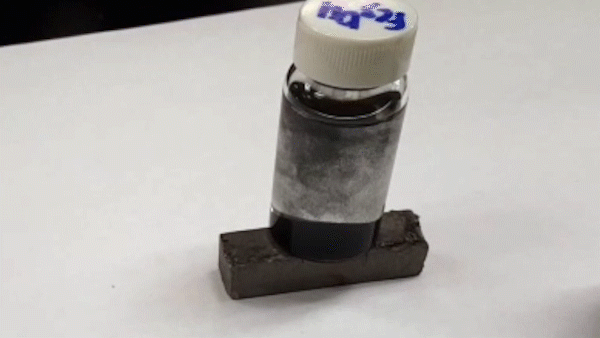Magnetic nanoparticles to be used to extract lithium from brines in the US

The nanoparticles can be introduced into brines from geothermal plants, produced water, mineral mining effluent, and seawater, where they latch onto free-floating target compounds. When exposed to a magnet, the nanoparticle’s iron core migrates toward the magnet, along with the critical material to which it is bound, and can be filtered from the brine.
As it awaits its patent approval, the technology is being adapted for the capture of lithium.
With the new sorbent, it only takes a few minutes to pull virtually all of the lithium from a brine solution by molecular collisions
“Current approaches for lithium extraction from water, for example, require a processing step that pumps large volumes of water, thousands of gallons a minute, through an ion exchange filtration system, making it both energy-intensive and expensive,” Pete McGrail, PNNL laboratory fellow and an expert on rare earth metal recovery technology, said in a media statement. “Our nanotechnology process allows us to miniaturize everything and removes the need for massive ion-exchange separators required in other processes.”
McGrail explained that, with the new sorbent, it only takes a few minutes to pull virtually all of the lithium from the solution by molecular collisions. The lithium can then be removed with a magnet where it is easily collected and purified.
The process is expected to work particularly well with oil and gas brines, considered an untapped domestic resource of lithium.
Given that the technology has undergone lab development for several years, the scientists say it is now ready for field testing. This work is going to take place at PNNL’s Richland campus in Washington, where the researchers partnered not only with Moselle but also with Canada Natural Resources and Conoco Phillips to conduct stress tests by subjecting the technology to extended cycle testing with the magnetic separator system. This is a needed step for full-scale industrial production.
Besides lithium, the technology will also be tested for the recovery of other critical metals such as cesium
“By using the magnetic nanoparticles to attach to the lithium particles in solution, we expect the resulting concentrate to be in a purer form, thereby reducing the cost of further processing,” Moselle Technologies CEO, Jerry Mills, said in the press brief. “And this will take out more than half the cost.”
Besides lithium, the technology will also be tested for the recovery of other critical metals such as cesium.
“We will work with the New-Zealand-based geothermal company Geo40, which has identified cesium present in its brines. In this project, the team will extend the work done to recover lithium to new sorbents that are highly selective for cesium. If successful, the group would like to build a pilot-scale plant in New Zealand,” McGrail said.



